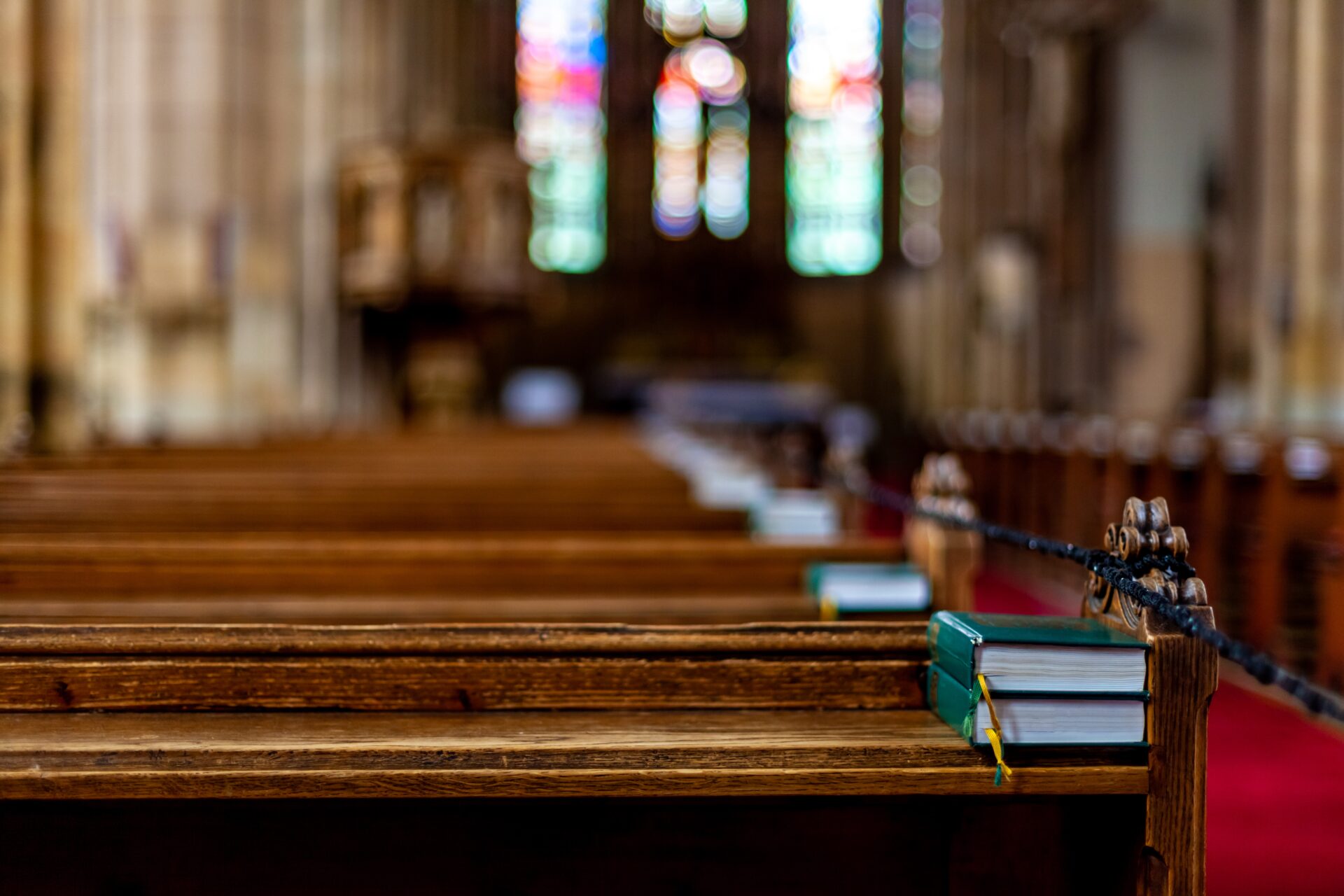
Bibles on a pew in a church.
Photo by Edovideo
AWAB and the Black Baptist church
At the 2022 Association of Welcoming & Affirming Baptists (AWAB) Board Retreat, board members were tasked to engage in critical reflection to discern AWAB’s successes and its areas of growth. Areas of success included AWAB’s stability, board diversity, and the steady flow of new churches which have decided to align with AWAB’s mission and vision. The number of churches which are located in the South and present for membership with deep, storied historical linkage to the Southern Baptist Convention, evidence the continued work of the Spirit. These congregations prior to membership decided to be a place of grace-filled affirmation for Queer identified persons. For some of these congregations such an affirmation is reminiscent of its decades-earlier decision to open membership to Blacks and perhaps a more recent decision to affirm women in church leadership. As with the opening of membership to Blacks, and the affirmation of women in leadership, the affirmation of Queer identity does not come without sacrifice. Budgets will be impacted, interpersonal relationships fractured, and in some cases, disassociation will occur. However, the Gospel’s call to grace-filled affirmation draws new churches, in some of the reddest areas of the country in general and the South in particular, to AWAB. As AWAB prepares to celebrate 50 years of work for LGBTQ+ inclusion in the Baptist church, first as American Baptists Concerned and then as AWAB, these successes provide a vindication concerning the rightness of the vision of AWAB’s original organizers as well as a glimpse into the promise of its future.
However, one growth area we identified is the need to increase the number of Black Baptist churches within the membership of AWAB. Of the nearly 150 AWAB churches, only 3 are Black Baptist. What accounts for the underrepresentation of Black Baptist churches within AWAB?
One reason for the underrepresentation of Black Baptist congregations within the membership of AWAB is related to AWAB’s lack of intentionality in outreach and recruitment of Black Baptist churches, many who are unaware of AWAB’s existence. Many of the churches in AWAB joined from associations with denominations which are predominately White. These churches were aware of the work of AWAB through its presence at denominational gatherings and/or interpersonal relationships with members of AWAB. However, AWAB has not had a presence at the gatherings of the Black Baptist denominations, or non-denominational gatherings with significant numbers of Black Baptists in attendance.
Of the nearly 150 Association of Welcoming and Affirming Baptists (AWAB) churches, only 3 are Black Baptist. What accounts for the underrepresentation of Black Baptist churches within AWAB, and how can AWAB address this?
Black Baptist churches are present within the American Baptist Churches, USA, the Cooperative Baptist Fellowship, and the Alliance of Baptists, yet are a smaller presence at these gatherings. Furthermore, with the exception of the Alliance of Baptists, when AWAB has been present at denominational gatherings, its participation was marginalized in some way which communicated AWAB’s perception as “an other” with whom engagement was to be avoided. Such framing presented AWAB as taboo. Intentionality around engagement and recruitment of the small number of Black Baptist churches present at these gatherings did not occur. In stating this fact, we have no desire to place blame or to dwell on the failures of the past. Rather, we recognize the need for intentional, sustained engagement and recruitment by AWAB if the underrepresentation of Black Baptist churches is to improve. AWAB gets this, as evidenced by including the goal of increasing the number of Black Baptist churches (with the naming of all the major Black Baptist church denominations) as part of its strategic plan. Additionally, AWAB has committed and is in the process of hiring a Director of Development whose position description includes engagement with those Black Baptist denominations identified in its strategic plan. Lastly, AWAB demonstrates its commitment to address the underrepresentation of Black Baptist churches through its commitment to diversity on its board of directors, of which I am a member. As AWAB celebrates its successes, it is deeply committed to growing the number of Black Baptist churches that identify with its vision and mission.
The first reason provided for the underrepresentation of Black Baptist churches with AWAB is identified as the historical lack of intentionality by AWAB to tackle the underrepresentation—providing AWAB with a call to action which it has accepted. The second reason offered for the underrepresentation of Black Baptist churches within AWAB is the reality of the complexity of all things sexual within the Black Church and community. As many are aware, a level of homonegativity exists within the Black Church which challenges its Civil Rights legacy. The independent Black Church was birthed in the context of America’s revolutionary zeitgeist with the foundational affirmations of pro-Christ, and pro-Black. As the original Black Lives Matter movement, the independent Black Church brought to the religious landscape of America the a priori knowledge of the good character of God, affirming the ungodly nature of slavery and the Imago Dei of Black bodies. In so doing, the Black Church rejected flat out the anti-Black framing of White Protestant evangelicals who appealed to the Bible both to support the God-ordained nature of slavery and the essential inferiority of Black bodies. Often illiterate, the members of the Black Church perfected an interpretative strategy which, while recognizing the Bible as an existential threat, also affirmed its usefulness in advancing the liberative aims of Black bodies longing to be free. The Bible’s content was appropriated to fit the contours of the lived experiences and hopeful aspirations of Black bodies living as it were in the “fiery furnace and the lion’s den” of chattel slavery and anti-Black oppression, with trauma-producing outcomes.
Without agency (a fundamental ability to act for the good of oneself), and subject to the stigmatizing stereotypes rooted in anti-Black framing, Black bodies (men and women) were exposed to sexual terrorism. This terrorism resulted in an internalization of the negative messaging of Black sexuality, as a taboo with which engagement is to be avoided. Avoiding engagement with Black sexuality is the path to respectability, which has been and remains a goal for Black bodies. Respectability is a survival strategy. It is the historical reality of sexualized trauma inflicted upon Black bodies that explains the social conservatism often posited as a reason for the homonegativity of the Black Church. The Black Church does not have primarily a problem with Queer sexuality, as much as it has a problem with sexuality in any expression. Engagement with Black sexuality and Black sexual expression for the Black community produces a collective triggering as the sexualized traumas inflicted upon Black bodies have caused deep wounds and scars left untreated, and too often supported by a biblical method of interpretation which is best identified as a selective literalism. This method ironically finds anti-Queer texts in the same “textual neighborhoods” which supported both slavery and anti-Black messaging.
It is in this context that AWAB is called to engage. This engagement will no doubt be challenging at many levels. This engagement, however, may represent a dimension of AWAB’s “for such a time as this.” As such, AWAB can be confident in the presence of God who is affirmed through the framing of providence, to position what is needed for those workers of grace-filled justice. It is with this faith, that I declare a future for AWAB which includes the Black Baptist church. It is so!
The Rev. Dr. Cliff Matthews is senior pastor, St. Luke Missionary Baptist Church, Charlotte, NC, and is a member of the AWAB Board of Directors.
The views expressed are those of the author and not necessarily those of American Baptist Home Mission Societies.



